This is the first full day of the convention. Registration opened at 10 in the morning so, we went off in search of caffeine and our registration packets. Caffeine was fairly easy to find as during the morning hours the hotel has a Starbucks coffee bar n the lobby with some breakfast type baked goods.
I picked up my tags and the program materials. My panel isn’t until Saturday at 10 and the dealers couldn’t move into their space until about 3 PM. This left time to go to some panels and stretch our imaginations and our intellect.
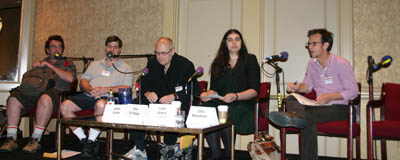
"SF as the Literature of Things" Panel
11: 00 SF as the Literature of Things. Panelists: Paul Di Filippo, Lawrence Person, John Clute, Leah Bobet (Leader), Chris Nakashima-Brown. It’s commonly agreed that stories set in the future can “really” be about the future or about the present. But in novels like William Gibson’s Pattern Recognition and Spook Country, and Bruce Sterling’s Zeitgeist and Zenith Angle, we are for the first time seeing stories set in the present which seem to be about the future. These fictions seem to argue that the future will be built bottom-up rather than top-down; that progress does not derive from the implementation of ideas but rather from the accumulation of quotidian technological change. Character in these works is not so much a matter of nature or nurture, but a product of our interaction with things, things produced as fast as we can (because we can) and without any deep consideration for their consequences. Is this “SF as a Literature of Things” ultimately just an interesting sub-genre, or might (or should) the field itself be morphing in its direction? There are more and more slipstream stories that start with an architectural setting or an object or some arcane text; do these reflect the same movement?
Some random notes:
Cyberpunk — things are symbolic indicators, they tell you about the world and background without having to do an “as you know Bob” informational dump for the reader.
Characters are defined by their interaction with the environment and their things/possessions. In Pattern Recognition a character doesn’t even show up until the middle of the book but by then we know all about the character and what to expect because of the description of the character’s apartment and things.
There was a lot of discussion about whether you could tell what a person was like from the things owned because we all have public and private personae. If all you see is the public face then are you that public face or are you still the private person you envision yourself to be?
We often seem, now-a-days, to experience the world through things. We film events and see it through our cameras, iphones, or recorders. We don’t see the actual events because we’re annotating and filming it. How does that effect our view of the world and things?
An audience member asked if we were to believe that things were reliable narrators and the panel generally agreed that while the things are narrators they are not necessarily reliable.
Noon: How to Write for a Living When You Can’t Live Off Your Fiction (Special Kaffeeklatsch). Barbara Krasnoff. You’ve just been laid off from your staff job, you can’t live on the royalties form your fiction writing, and your Significant Other has taken a cut in pay. How do you pay the rent? Well, you can find freelancework writing articles, white papers, reviews, blogs, and other non-sfnal stuff. Despite today’s lean journalistic market, it’s still possible to make a living writing, editing, and/or publishing. Let’s talk about where and how you can sell yourself as a professional writer, whether blogging can be done for a living, and how else you can use your talent to keep the wolf from the door. Bring whatever ideas, sources, and contacts you have.
The room was packed. We networked and pickup up some useful ideas and URLs of resources. Rather than go over all the tips and idea presented, I suggest that you go to Barbara’s website of “Useful sites for Earning a Living” at:
http://bkrasnoff.googlepages.com/resourcesforfreelancewriters
Also check out the websites for:
American society of Journalists and Authors: http://www.asja.org
The Authors Guild: https://www.authorsguild.org
National Writers Union: http://www.nwu.org
Freelancers Union: http://www.freelancersunion.org
mediabistro.com: http://mediabistro.com
Editorial Freelancers Association: http://www.the-efa.org
National Association of Science Writers: http://www.nasw.org
American Medical Writers Association: http://www.amwa.org
National Book Critics Circle: http://www.bookcritics.org
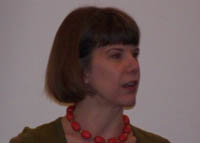 1:00 Narrative Psychology and Science Fiction. Robin Abrahams with discussion by Ellen Asher, Eric M. Van, David Swanger. Talk/Discussion (60 min.). If a character gets shot, it’s a mystery story. If a character gets shot with a phaser, it’s science fiction. But are there elements to science fiction that go deeper than the surface tropes? Psychologist and writer Robin Abrahams discusses what cognitive psychology and her own research about mental models of literary genres–including science fiction, fantasy, and horror–and what personality factors correlate with a liking of different kinds of stories.
1:00 Narrative Psychology and Science Fiction. Robin Abrahams with discussion by Ellen Asher, Eric M. Van, David Swanger. Talk/Discussion (60 min.). If a character gets shot, it’s a mystery story. If a character gets shot with a phaser, it’s science fiction. But are there elements to science fiction that go deeper than the surface tropes? Psychologist and writer Robin Abrahams discusses what cognitive psychology and her own research about mental models of literary genres–including science fiction, fantasy, and horror–and what personality factors correlate with a liking of different kinds of stories.
What is personality if not your interpreted style? Perhaps people like stories that fit their interpretive style. Abraham’s research asked undergraduates to rate various types of genre on several different opposition scales (predicable/unpredictable; emotional/unemotional, etc.). There were some surprises and some “Duh” results.
most predicable — romance
most unpredictable — mystery
most unemotional — science fiction
most bound to time and place — science fiction
most optimistic — self-help
most morally complex characters — biography
most considered to have clear good and bad guys — science fiction
most read to be entertained — humor
most read to learn — self-help
most often written for money — horror
most realistic — self-help
fantasy found high on escapism
science fiction was neutral on escapism
There was a lot of other results but I couldn’t keep up with the talk and take notes too.
There was an interesting thought thrown out that with education and specialization that people raise sub-ordinate categories up to become base categories. For example most people consider dogs a base category. But, to people who breed dogs or are very interested in them knowing that it is a dog doesn’t tell them anything. The sub-ordinate category of breed raises to the base category level.
I then took over getting our table in the dealers’ room setup while Hyperion attended a panel at 2 PM.
2:00 Where the Turtles Stop: Preons as the Most Funadamental Particle. Eric M. Van. Talk (60 min.). The discovery (invention?) of the quark simplified the “particle zoo” immensely, but the Standard Model of Physics still contains an embarrassing plethora of “fundamental” particles: six quarks and six leptons (both of which fit into neat and cognate 2×3 grids) and a variety of bosons (the photon, gluon, etc.). That all of these particles might be composed of various combinations of two or three truly fundamental “preons” seems obvious. Van will explain why the preon concept was unfairly rejected in the ’70s and ’80s and talk about its recent resurrection by t he Australian physicist Sundance Bilson-Thompson. He will then (of course) present his own preon model, which he argues is simpler and has much more (way cool, in fact) explanatory power. Note: this talk is designed to be intelligible even to those who believe “leptons” manufacture iced tea and Cup of Soup.
 While the talk was interesting, it was wholly theoretical. There is no evidence to support the existence of preons, and there may never be any. What makes the preon theory attractive is both its simplicity, and the ability to explain much (if not all) of the Standard Model and Quantum Mechanics as an emergent behavior of these simple entities. Van’s model is based on what’s gone before, but is modified to fit his own understandings. Given that, the preon model is basically that there is only one basic entity in the universe, the preon and it’s anti-particle, which is just the preon with a negative spin. Things get a little strange at this point as preons live their lives in p-space, a structure which contains two spacial dimensions, one time dimension, and a special non-time, non-space dimension called “qwa”. And it’s in this Qwa dimension the the preons do their spinning. According to the theory, preons are only happy in even number pairs, although the pair may contain any combination of preons and anti-preons. Since each preon has a charge of either +1/6 or -1/6, combining six preons (or anti-preons) gives you all the standard particles in the Hadron family. Other combinations of two or four preons gives you other “normal” particles. The rest of the zoo is, presumably, made up of other combinations. What makes the preon theory predictably nice is that there are multiple ways that two groups of three preons and be bound together. And those methods then determine the masses of the resulting particles, such as the Electron, Muon, and Tauon particles. There was a good deal more, but I think that pretty much gives the flavor of the theory. One last bit, Van assumes that gravity is an emergent property of p-space, and therefore predicts that when the LHC is finally brought on line, they will NOT find the Higgs Boson. Well, we shall see.
While the talk was interesting, it was wholly theoretical. There is no evidence to support the existence of preons, and there may never be any. What makes the preon theory attractive is both its simplicity, and the ability to explain much (if not all) of the Standard Model and Quantum Mechanics as an emergent behavior of these simple entities. Van’s model is based on what’s gone before, but is modified to fit his own understandings. Given that, the preon model is basically that there is only one basic entity in the universe, the preon and it’s anti-particle, which is just the preon with a negative spin. Things get a little strange at this point as preons live their lives in p-space, a structure which contains two spacial dimensions, one time dimension, and a special non-time, non-space dimension called “qwa”. And it’s in this Qwa dimension the the preons do their spinning. According to the theory, preons are only happy in even number pairs, although the pair may contain any combination of preons and anti-preons. Since each preon has a charge of either +1/6 or -1/6, combining six preons (or anti-preons) gives you all the standard particles in the Hadron family. Other combinations of two or four preons gives you other “normal” particles. The rest of the zoo is, presumably, made up of other combinations. What makes the preon theory predictably nice is that there are multiple ways that two groups of three preons and be bound together. And those methods then determine the masses of the resulting particles, such as the Electron, Muon, and Tauon particles. There was a good deal more, but I think that pretty much gives the flavor of the theory. One last bit, Van assumes that gravity is an emergent property of p-space, and therefore predicts that when the LHC is finally brought on line, they will NOT find the Higgs Boson. Well, we shall see.

"How to Review" Panel
3:00 How to Review. Panelists: Rose Fox, Gary K. Wolfe, Charles N. Brown (Leader), Michael Dirda, Lev Grossman. A roundtable on reviewing: what to do and what not to do. How do different audiences need different sorts of reviews?
I was late to the panel because I need to work more in the dealers’ room but managed to get there for the last half hour.
One thing to remember is that writing that isn’t fun to read won’t be read, and that includes reviews.
Review space in most places is shrinking. Reviews should be essays and part of the essay is to give the feelings and thoughts that you had upon reading the work.
Trashing a book doesn’t make a review. You can write a negative review but you must explain why it isn’t good — where does it fail and how.
A review needs to be an accurate account of the book.
The audience for genre review (since this is a genre convention) need not be written for the fan but for the general intelligent reader who likes a wide variety of reading material. Hopefully to entice them to try something different or something similar to another author that they enjoy.
Dirda says he believes that people should read more and beyond the Best Seller List.
5:00 Memorial Guest of Honor Interview. Michael Swanwick. Talk (60 min.) Swanwick will interview the late Hope Mirrlees, author of “Paris, a Poem” and Lud-in-the-Mist, in person.
This was very interesting and especially well done. I’d downloaded Lud-in-the-Mist for my Kindle and had read Swanwick’s short essay about Hope Mirrlees before the convention. For this presentation there was a woman who looked much as you’d expect Hope Mirralees to look like. Swanwick stated that he would be asking questions and then turn it over to the audience but there had been a great deal of negotiation for Mirrlees special appearance and that only questions which had well documented answers available publicly could be asked. The humor and British air were refreshing and endearing.

"How Do We Choose What We Read" panel
8:00 How Do We Choose What We Read? Panelists: Michael Bishop, Chuck Rothman, Victoria Janssen, Rosemary Kirstein (Leader), Rick Wilber, Michael Dirda. Those of us with broad tastes in literature are constantly choosing among many different types of story. What determines these choices? Do our story preferences vary with psychological state? What’s behind the phenomenon of concentrating on one subgenre or even one author, or acquiring a transient aversion to same?
First off, Kirstein asked what each panelist’s first genre books was or how they decided to read genre. Books mentioned were the ones with a rocket ship or atom on the spine. Danny Dunn. Tom Swift. Tom Swift, Jr. The Magician’s Nephew. Lucky Star. Podkayne of Mars. Have Spacesuit will Travel. Mostly they just stumbled across a book or it was recommended to them and they liked it. Bishop said his first genre was baseball stories then SF/F.
As adults:
Dirda said he enjoys history and will pick a book because it’s an interesting historical, an author he likes, or a topic he wants to learn about. He tries to keep an even mix of fiction and nonfiction. Since he reviews, he reads all the time but seldom just for pleasure because he reviews what he reads.
Wilber said that he travels a lot and tends to stick with an author. As a child if he liked a book, he then read all the books by that author or in the series. As an adult he still does that. He’s a completist. If he’s traveling he’ll sometimes pick up a book at the airport because of the size — picking one he thinks will last the trip. He also reads books he thinks he should have read to fill in the gaps in his reading mostly picking up the classics he hasn’t read before.
Rothman also tends read authors he’s liked in the past. If it’s a new book, he’ll pick it up if it is very different from other books of the type that he’s read before. Usually, the choice is because of the blurb and seldom from the cover art.
Janssen said that she chooses books for two reasons 1) for herself and for pleasure reading and 2) for work or the author part of herself. The second is to be read as an author looking at the structure, style, and tropes and conventions of a genre. She’s been writing for Harlequin Spice and is filling in the gap in her romance reading education.
Dirda said when he is starting to read a new author or in a new genre he looks for the best representation of the work by the person or in the field. That gives him some point of comparison and a starting point for finding more books in the area.
Bishop said he’s drawn to books by reviews. Reviews got him reading some mystery writers that he hadn’t come across before and he really enjoyed the work and then read more of them. He’d brought Newsweek with the cover story, “What to read now”. It was a list of fifty books that everyone should read. Number one was by Anthony Trollope and there were only two fantasy/science fiction books: Do Androids Dream of Electric Sheep (Philip K. Dick)
and The Dark is Rising (Susan Cooper)
Wilber said he reads about three books a week: 1 for business/work, 1 for fun, and 1 book that he feel he should have read (usually a classic).
All agreed that if a book doesn’t give you pleasure and you don’t have to read it for a class or for work — give it up. Sometimes you can return at a later time and find that it now fits your needs and other times it will just be a bad book that doesn’t work for you or at all.
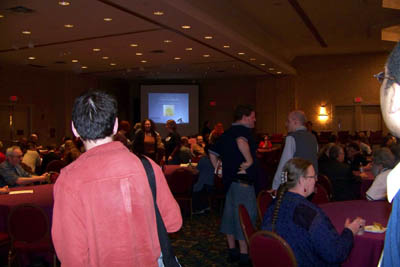
Grand Ceremony
10:00 Readercon 20 Grand Ceremony. Listed all the past Guests of Honor and of those past guests all those who are attending this year’s convention.
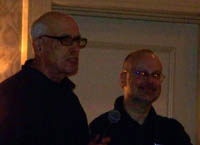
Cordwainer Smith Award Ceremony
10:30 The 2009 Cordwainer Smith Rediscover Award Ceremony. Barry N. Malzberg and Robert J. Sawyer.
This year’s winner was A. Merritt.
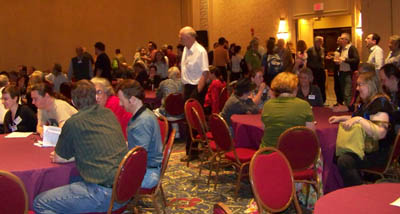
Meet the Prose Party, Crowd
10:45 Meet the Pros(e) Party.
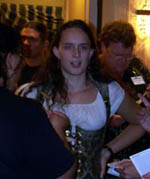
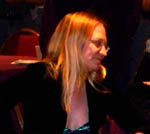
There was cake and it was good. At this event the Pros all have a sheet of peel off labels with a phrase or sentence that they sent in to the convention people. Attendees talk to the Pros to try to collect a label from each one. It’s a nice bit to get people to talk and mix a bit. Most authors use something from their books or story stories. Since I’m not a writer but a reviewer, each year I try to come up with a sentence that is very weird while making sense in context of SF/F. This year I wrote:
It’s as if Elizabeth Bennet and The Tick try to explain the meaning of life to a race that has no numbers.
Now it’s late and we’re off to relax and sleep, perhaps to dream. Tomorrow is another full day.

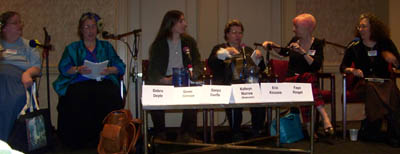


 1:00 Narrative Psychology and Science Fiction. Robin Abrahams with discussion by Ellen Asher, Eric M. Van, David Swanger. Talk/Discussion (60 min.). If a character gets shot, it’s a mystery story. If a character gets shot with a phaser, it’s science fiction. But are there elements to science fiction that go deeper than the surface tropes? Psychologist and writer Robin Abrahams discusses what cognitive psychology and her own research about mental models of literary genres–including science fiction, fantasy, and horror–and what personality factors correlate with a liking of different kinds of stories.
1:00 Narrative Psychology and Science Fiction. Robin Abrahams with discussion by Ellen Asher, Eric M. Van, David Swanger. Talk/Discussion (60 min.). If a character gets shot, it’s a mystery story. If a character gets shot with a phaser, it’s science fiction. But are there elements to science fiction that go deeper than the surface tropes? Psychologist and writer Robin Abrahams discusses what cognitive psychology and her own research about mental models of literary genres–including science fiction, fantasy, and horror–and what personality factors correlate with a liking of different kinds of stories. While the talk was interesting, it was wholly theoretical. There is no evidence to support the existence of preons, and there may never be any. What makes the preon theory attractive is both its simplicity, and the ability to explain much (if not all) of the Standard Model and Quantum Mechanics as an emergent behavior of these simple entities. Van’s model is based on what’s gone before, but is modified to fit his own understandings. Given that, the preon model is basically that there is only one basic entity in the universe, the preon and it’s anti-particle, which is just the preon with a negative spin. Things get a little strange at this point as preons live their lives in p-space, a structure which contains two spacial dimensions, one time dimension, and a special non-time, non-space dimension called “qwa”. And it’s in this Qwa dimension the the preons do their spinning. According to the theory, preons are only happy in even number pairs, although the pair may contain any combination of preons and anti-preons. Since each preon has a charge of either +1/6 or -1/6, combining six preons (or anti-preons) gives you all the standard particles in the Hadron family. Other combinations of two or four preons gives you other “normal” particles. The rest of the zoo is, presumably, made up of other combinations. What makes the preon theory predictably nice is that there are multiple ways that two groups of three preons and be bound together. And those methods then determine the masses of the resulting particles, such as the Electron, Muon, and Tauon particles. There was a good deal more, but I think that pretty much gives the flavor of the theory. One last bit, Van assumes that gravity is an emergent property of p-space, and therefore predicts that when the LHC is finally brought on line, they will NOT find the Higgs Boson. Well, we shall see.
While the talk was interesting, it was wholly theoretical. There is no evidence to support the existence of preons, and there may never be any. What makes the preon theory attractive is both its simplicity, and the ability to explain much (if not all) of the Standard Model and Quantum Mechanics as an emergent behavior of these simple entities. Van’s model is based on what’s gone before, but is modified to fit his own understandings. Given that, the preon model is basically that there is only one basic entity in the universe, the preon and it’s anti-particle, which is just the preon with a negative spin. Things get a little strange at this point as preons live their lives in p-space, a structure which contains two spacial dimensions, one time dimension, and a special non-time, non-space dimension called “qwa”. And it’s in this Qwa dimension the the preons do their spinning. According to the theory, preons are only happy in even number pairs, although the pair may contain any combination of preons and anti-preons. Since each preon has a charge of either +1/6 or -1/6, combining six preons (or anti-preons) gives you all the standard particles in the Hadron family. Other combinations of two or four preons gives you other “normal” particles. The rest of the zoo is, presumably, made up of other combinations. What makes the preon theory predictably nice is that there are multiple ways that two groups of three preons and be bound together. And those methods then determine the masses of the resulting particles, such as the Electron, Muon, and Tauon particles. There was a good deal more, but I think that pretty much gives the flavor of the theory. One last bit, Van assumes that gravity is an emergent property of p-space, and therefore predicts that when the LHC is finally brought on line, they will NOT find the Higgs Boson. Well, we shall see.









